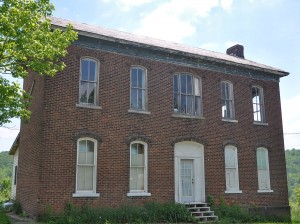
Yellowed newspapers and old readers reveal what preceding generations thought important, what shaped our ancestors’ perceptions and ours.
At a farm auction in 1958 when I was 12, I found in a ‘FREE’ box a hard-used, 60-year-old copy of McGuffey’s Sixth Eclectic Reader.[1] A couple of nights later, I found myself reading in it Thomas Gray’s ‘Elegy Written in a Country Churchyard’ (1751).[2] It made me as melancholy as the auction where I found the McGuffey.
The poet, I now know, was a Cambridge Don with little or no connection to rural life. Nonetheless, he pictured himself in a country graveyard at dusk:
Beneath those rugged elms, that yew-tree’s shade,
Where heaves the turf in many a mould’ring heap,
Each in his narrow cell for ever laid,
The rude forefathers of the hamlet sleep.
His romantic view of village life resonated with me. Farm auctions spurred by the ready availability of factory jobs and the ready cash of strip miners took place monthly, as I recall. The eastern Ohio countryside was emptying. Its human relics were decaying.
Let not Ambition mock their useful toil,
Their homely joys, and destiny obscure;
Nor Grandeur hear with a disdainful smile
The short and simple annals of the poor.
Years before I learnt the importance of ‘The Elegy’ in English literature, I memorised stanzas from this much quoted poem.
The boast of heraldry, the pomp of pow’r,
And all that beauty, all that wealth e’er gave,
Awaits alike th’ inevitable hour.
The paths of glory lead but to the grave.
Gray’s picture of rural life I could imagine in the century and a quarter before the Depression of 1929-39. Reading The Farm Journal and listening to Don McNeill’s ‘Breakfast Club’ allowed me to form a rural idyll in my mind that my countryside belied.
More mature minds than mine were less impressed with Gray than I was. Consider what Thomas Hardy in 1874 made of this couplet – and did with Gray’s imagined rustics:
Far from the madding crowd’s ignoble strife,
Their sober wishes never learn’d to stray….
One stanza I recalled often over the next 50 years but I hadn’t memorised. I didn’t appreciate its interconnected references. Among those buried, Gray suggested, were:
Some village-Hampden, that with dauntless breast
The little tyrant of his fields withstood;
Some mute inglorious Milton here may rest,
Some Cromwell guiltless of his country’s blood.
‘Some mute inglorious Milton’ haunted me then — and now.
The connection among the three names was the English Civil War (1642-49) which I’ve written about here and here. All three stood with Parliament against the King. McGuffey’s Sixth in notes makes plain its view:
John Hampden (b. 1594, d. 1643) was noted for his resolute resistance to the forced loans and unjust taxes imposed by Charles I on England….
Oliver Cromwell (b. 1599, d. 1658) was the leading character in the Great Rebellion in England. He was Lord Protector the last five years of his life, and in many respects the ablest ruler that England ever had.[3]
Gray wrote at Cambridge, the center of The Great Rebellion’s intellectual force.
The importance to America of the English Civil War and the Commonwealth that followed Charles’s execution in 1649 is largely forgotten today. Not so a century ago – when millions of students used McGuffey – or a century before that when the Constitution was drafted.
That memory and the context of the stanza I quoted put Gray’s ‘Elegy’ on reading lists. Here it is, again, with the stanzas following:
Some village-Hampden, that with dauntless breast
The little tyrant of his fields withstood;
Some mute inglorious Milton here may rest,
Some Cromwell guiltless of his country’s blood.
Th’ applause of list’ning senates to command,
The threats of pain and ruin to despise,
To scatter plenty o’er a smiling land,
And read their hist’ry in a nation’s eyes,
Their lot forbade: nor circumscrib’d alone
Their growing virtues, but their crimes confin’d;
Forbade to wade through slaughter to a throne,
And shut the gates of mercy on mankind….
To my mind, these three stanzas express the Jeffersonian vision of American life: ‘…nor circumscrib’d alone/Their growing virtues, but their crimes confin’d’. In this I hear the republican aspirations that gave rise to the Declaration of Independence and the Constitution and the realism that recognized the necessity of learning, laws and social order.
The McGuffey editors, I think, had a clear idea of ‘The Elegy’s’ message.
And in this they kept faith with the series namesake, William Holmes McGuffey, who began his career at Ohio colleges created in Jefferson’s image and ended at the University of Virginia which Jefferson founded.
Of these colleges and their influences, more anon.
Notes
1. McGuffey’s Sixth Eclectic Reader, rev. ed., (New York: American Book Co., 1896). A look at its table of contents quickly reveals this was no sixth grade text as we know them, but a high school level text. Its contents fascinated me then, amaze me now. It is a unique lens through which to see how youths were educated and what represented the best of popular culture.
2. Id., pp. 108-113.
3. Id., p. 113
Recent Comments